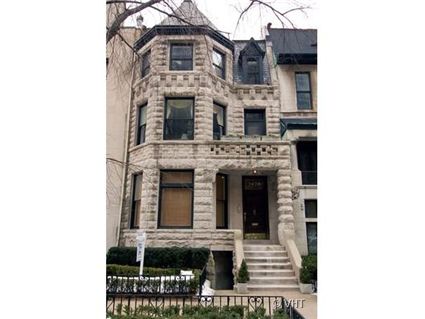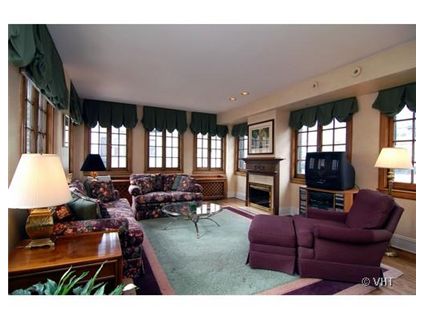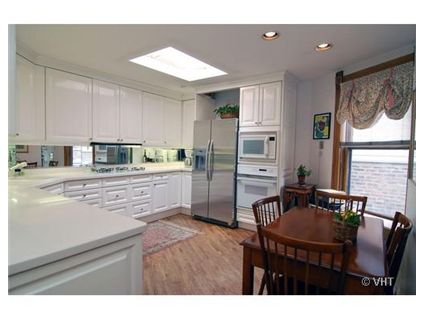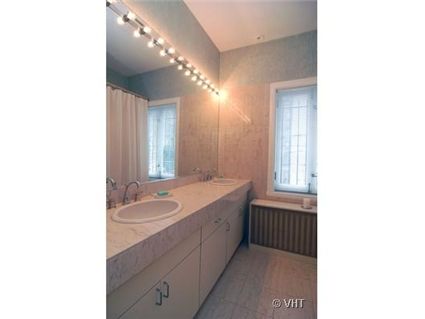Didn’t Buy It? Now You Can Rent It: 1434 N. Astor
A third-floor two bedroom duplex vintage unit was recently on the market at 1434 N. Astor in the Gold Coast. (This is a different unit from the vintage greystone at 1331 North Dearborn we recently chattered about).
After being listed a few months, a tipster told me it recently sold.
But did it?

It has now been re-listed as a rental. The pictures in the rental listing are the same as the ones that were in the for sale listing.
Apparently, if you missed out on buying it, you can still live in it by renting it.



Peter Tortorello at Koenig & Strey has the rental listing (pictures and virtual tour available).
Unit #3: 2 bedrooms, 2 baths, 1400 square feet, duplex
- Sold in June 1998 for $302,500
- Was listed in Spring 2008 for $729,000
- Sold in July 2008 for $685,000 (?)
- Currently listed for rent at $2850 (parking is leased)
- Assessments of $750 a month
- Taxes of $10,613
- Space pac cooling
so…if you come up with 20%, you take a mtg for 550K, which at 6% interest only is 2750…which is how much you can rent for. But what about 750 assmnt annd 900 tax???
Rent is very reasonable for location/unit.
“a mtg for 550K, which at 6% interest only”
Wow, you must have a ton of assets (and pledged some of them) to obtain such non-market terms on a Jumbo. Or are you a friend of Angelo?
Anon, think before you post next time, you’ll look smarter.
I did that to show what the cost of owning is vs renting. Does it really matter if you use 6% or 7%? Or the conditions under which you obtain the loan? And I am really, really, really sorry I did not check the latest market terms for jumbo loans on a 2/2 condo, or revealed which assets i will pledge. Really.
What’s with the $750 assesment? Are there some amenities that I’m not seeing?
aleks, think before you post next time, you’ll look like less of a douchebag.
It was a jab directed at the unrealistic financing expectations of some on this board, dude. I guess you aren’t one of them. Sorry.
Oh, and Happy Friday, everyone!
Damn, too bad I missed the opportunity to buy it. Now I’ll just have to rent it at about 1/3rd the monthly cost of owning.
Sure enough the MLS shows it closing on July 15. So someone bought this. Let’s review the math from another perspective. Rent = 34200, Assessments = 9000, taxes = 10613. Net to owner = 14587 or a 2.1% return on assets. Doesn’t matter how you finance this it’s a bad deal. Some people just really love real estate.
The thing is that renting is often a better deal than owning. Fortune just released some data on cities where renting is a fraction of owning.
There is some funny quirk of the tax code where you are actually *advantaged* by buying a place and renting it out for two years before moving in yourself. Several of my tax-lawyer friends are doing this. It might only apply to new construction, though. I keep meaning to ask them. Has anyone heard of this? If it applies to a unit like this, maybe that is what is going on. Frankly, it would be the only way to explain it.
Can you write off the updating and remodeling costs if your unit is a rental property?
I think they’re referring to a 1031 Exchange. But it’s more complex than that, and not quite what you’re saying – if that is what they meant.
I’m totally speculating here. If you live in a place for 2 out of 5 years and sell you don’t have to show the gain. If you rent a place you can depreciate it while you rent it. Perhaps if you subsequently live there you don’t have to recapture the depreciation?
Investor, yes, that’s the one.
The point of 1031 Exchanges is to defer taxes on investment properties. However, there is a loophole that allows that “deferral” to become total avoidance.
Let’s say you buy two preconstruction condos, and when it comes time to close on them they both have appreciated substantially. But if you sell both now you get taxed fully. In order to completely avoid taxes you:
1. Use one as a primary residence, live there for two years, then sell it and take your tax free profit (assuming you don’t go above the max allowed).
2. Rent the second condo for 1 year (a soft rule for 1031 exchanges), then sell it and roll it into a new investment property. By the 1031 rule, you don’t have to pay taxes on the profit of the sale since you are rolling it into a new investment property and not actually taking the profit.
3. Rent the new investment property for 1 year (I think that’s the soft rule for this step too, though not certain), then convert it to a primary residence.
4. Live in this converted-to-primary residence for 2 years, then sell and get your tax free gain (again, assuming you haven’t gone over the max profit allowed).
A lot more straightforward than I’ve portrayed it, but it can get very tricky. There are rules and time limits you must abide by or else it all goes bust.
Actually, thinking twice about this, my above case is unnecessarily complex. You don’t need to sell the second condo at all, you just need to rent it for two years, then convert it to a primary residence.
However, the person you’re speculating about might have done this. He probably went the route I outlined above because he didn’t buy precon.
The women I know who did this definitely didn’t sell the new property (but they did all buy precon–not sure what that would make a diff, but I no virtually nothing about this).
They basically bought, and moved themselves into a rental while, I think, renting out both Old Residence AND New Residence in the meanwhile, and for two years (maybe need a year to “convert” each to an investment?)
Anyway, it has occured to me before that the spectacular number of (losing) rentals in the beautiful new buildings, might in part be explained by these 1031 thingies. Most of the people buying into places like 340 OTP and 600 N Fairbanks are rich enough to be using tax advisors. If so, then when look like insane purchases at losing rents, might not be so insane after all. Guess we’ll see more clearly in a year or two whether these exchanges explain a significant proportion of the rentals.
I’ve never understood how losing money was a tax avoidance strategy unless is was a sham transaction without risk to the taxpayer – and previously offered for sale by KPMG earlier this decade. Could someone explain with figures how losing money on a rental produces a net gain in tax avoidance?
from the example above, it seems the strategy is to rent it until you can move in for 2 years-which makes it your primary residence, so when you sell it you’re not taxed on the profit. the tax avoidance strategy isn’t the renting, it’s living in the place for 2 years. If i’m understanding correctly.
Just so you know, the 2 of 5 year capital gains exemption which allowed you to avoid taxes on the sale of a rental property by making it your primary residence for 2 years has been amended by the housing bailout bill signed into law by Bush last week.
Check out section 3092:
http://www.house.gov/apps/list/press/financialsvcs_dem/hr3221_bill_text.pdf
Starting on January 1, the amount of your exemption is determined by the ratio of how long you owned the place and the length of time it was your primary residence. Obviously, there is no change to people who own only 1 home, but people that own more than 1 home just got a loophole slammed shut.
CH,
Yes, that’s right.
Tipster,
Thanks for the link. I was unaware of this.
i couldnt find it in that bill, not doubting it’s there but the thing is huge and searching “primary residence” didnt get it.
it’s a pretty nice loophole- if you can get rent to support the properties you own but don’t live in. you just move every 2 years and skirt the taxes..kind of fun. though it would have been more fun in the future if obama raises the cap appreciation tax.
CH — look for “principal residence”, or just look at section 3092 of the bill.
got it. and my bad for not noticing the section 3092 was specified with the link. it does seem that if spouses or ex-spouses live in the residence, you still skirt the tax. so the strategy becomes marrying (and divorcing) people who would make good tenants. the loophole is not completely closed!
I’ve always questioned people who overpay for properties in order to avoid the tax.
if this property is negative cash flor $1500 per month for two years before the buyer moves in that’s $36,000 in cash losses. How much profit could he have been rolling over to buy this unit in order to justify this loss?
if long term cap gains is 15% that implies his profit must have been at least $240,000 – a hard profit to make in this market.
and why wouldn’t they buy a cheap unit, rather a full priced unit? cheap units also benefit from deprecation
i got a D in my college accounting class. i’m sure i’m the one who doesn’t get it.
So if I own a rental building full of ex-wives, I just have to save more on taxes than I pay out in alimony. Time to start concealing some assets.